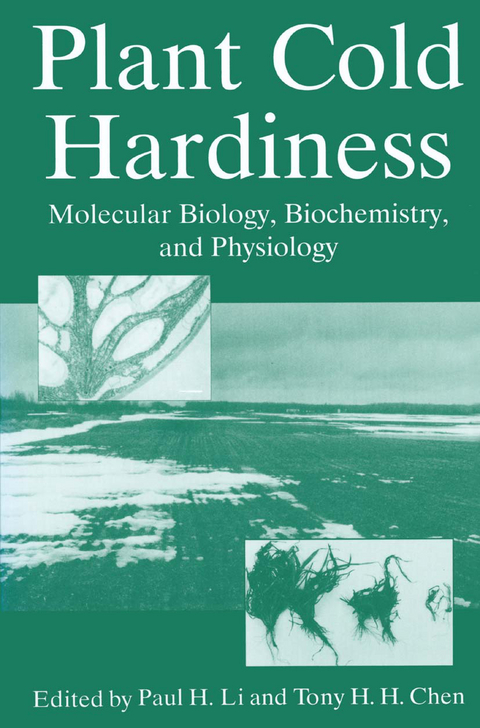
Plant Cold Hardiness
Kluwer Academic/Plenum Publishers (Verlag)
978-0-306-45712-8 (ISBN)
I: Molecular Genetics of Cold Acclimation.- 1. Molecular Mechanism of Plant Cold Acclimation and Freezing Tolerance.- 2. Low Temperature Signal Transduction during Cold Acclimation of Alfalfa.- 3. Regulation of Plant Gene Expression in Response to Low Temperature.- 4. Constitutive Freezing Tolerant Mutants in Arabidopsis: A Genetic Approach to Signaling Transduction in Cold Acclimation.- 5. Arabidopsis Mutants Impaired in Freezing Tolerance after Cold Acclimation.- 6. Frost Hardiness and Cold Acclimation in Solarium Species.- 7. Understanding Genetic Control of Freezing Resistance Using Potato Species as a Model System.- 8. The Dicktoo x Morex Population: A Model for Dissecting Components of Winterhardiness in Barley.- 9. Mapping of Genes Controlling Cold Hardiness on Wheat 5A and Its Homologous Chromosomes of Cereals.- 10. Genetic Control of Cold Hardiness in Blueberry.- II: Biochemical and Physiological Mechanisms of Low Temperature Tolerance/Injury.- 11. Molecular Chaperones: Do They Have a Role in Cold Stress Responses of Plants?.- 12. Characterization of Antifreeze Proteins from Winter Rye.- 13. Protection of Thylakoid Membranes from Freeze-Thaw Damage by Proteins.- 14. Investigating the Role of Lipid Metabolism in Chilling and Freezing Tolerance.- 15. Effect of Cold Acclimation on Membrane Lipid Composition and Freeze-Induced Membrane Destablization.- 16. Regulation of Cold Acclimation: A Complex Interaction of Low Temperature, Light, and Chloroplastic Redox Poise.- 17. A Comparison of the Cold Hardiness Potential of Spring Cereals and Vernalized and Non-Vernalized Winter Cereals.- 18. Active Oxygen and Freezing Tolerance in Transgenic Plants.- 19. Abscisic Acid-Induced Chilling Tolerance in Maize.- 20. Molecular Mechanisms of Chilling-Induced Oxidative Stress Injury and Tolerance in Pre-Emergent Maize Seedlings.- 21. Characterization of Vacuolar H+-ATPases that Are Sensitive and Tolerant to Cold.- 22. Phytochrome Overexpression and Cold Hardiness in Transgenic Populus.- 23. Responses of Woody Plant Cells to Freezing: Investigations on the Role of the Plant Cell Wall.- 24. Cell Tension and Cavitation in Plants during Freezing: Their Role in Injury.- III: Modulation of Low Temperature Tolerance and Agricultural Implications.- 25. Involvement of Abscisic Acid and Proline in Cold Acclimation of Winter Wheat.- 26. Differential Accumulation of Oligosaccharides and Freezing Tolerance of Alfalfa.- 27. Oligosaccharides as Endogenous Cryoprotectants in Woody Plants.- 28. The Use of Infrared Video Thermography to Study Freezing in Plants.- 29. Breeding of Cold Hardy Woody Landscape Plants.- 30. Cold Hardiness Factors that Affect Nursery Production of Woody Plants in Southeastern United States.- 31. Winter Survival of Cereals Parasitized by Snow Mold.- 32. Biological Control of Snow Mold.- 33. Induction of Chilling Tolerance by Brief Abiotic Shocks.- Participants Photograph.
| Erscheint lt. Verlag | 31.1.1998 |
|---|---|
| Zusatzinfo | XI, 368 p. |
| Verlagsort | New York |
| Sprache | englisch |
| Maße | 178 x 254 mm |
| Themenwelt | Studium ► 2. Studienabschnitt (Klinik) ► Humangenetik |
| Naturwissenschaften ► Biologie ► Botanik | |
| Naturwissenschaften ► Biologie ► Genetik / Molekularbiologie | |
| Naturwissenschaften ► Physik / Astronomie ► Angewandte Physik | |
| ISBN-10 | 0-306-45712-1 / 0306457121 |
| ISBN-13 | 978-0-306-45712-8 / 9780306457128 |
| Zustand | Neuware |
| Haben Sie eine Frage zum Produkt? |
aus dem Bereich


